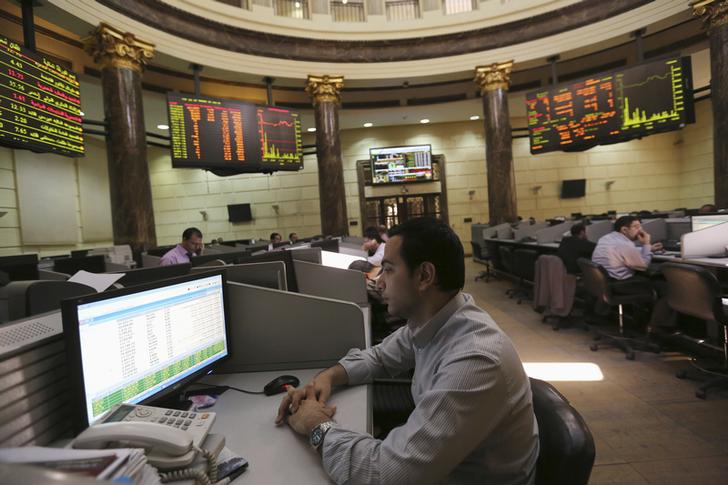Latest NEWS
- Aswat Masriya, the last word
- Roundup of Egypt's press headlines on March 15, 2017
- Roundup of Egypt's press headlines on March 14, 2017
- Former Egyptian President Hosni Mubarak to be released: lawyer
- Roundup of Egypt's press headlines on March 13, 2017
- Egypt's capital set to grow by half a million in 2017
- Egypt's wheat reserves to double with start of harvest -supply min
- Roundup of Egypt's press headlines on March 12, 2017
Egypt stock market slides further, Mubarak-era businessmen's shares frozen

A trader watches his monitor at the Egyptian stock exchange in Cairo April 1, 2014. REUTERS/Mohamed Abd El Ghany
CAIRO, Nov. 9 (Aswat Masriya) – Egypt’s stock market froze Monday the accounts of 17 people including several Mubarak-era businessmen, among them Salah Diab who was arrested Sunday, as the market continued to dip for the second day in a row.
The benchmark index EGX 30 dropped by 2.84 percent on Monday, bringing its total retreat over the past two days to more than 5 percent and both the medium and small enterprises index EGX 70 and the broader EGX 100 also plummeted today.
Among the hardest hit stocks Monday were tourism and resort stocks as Egypt continues to grapple with the ramifications of the Russian plane that crashed in the Sinai desert on October 31.
At noon, the chairman of the Egyptian stock exchange Mohamed Omran said he received a notice from the Egyptian prosecutor's office to freeze the assets and accounts of 17 individuals, state run MENA reported.
Omran said the bourse administration immediately implemented the decision, preventing any of the named businessmen from trading in the stock market Monday.
Diab and his son were arrested Sunday morning and for the unlicensed possession of weapons and ammunition.
The founder of Al-Masry al-Youm newspaper and Chairman of PICO Group, Diab is one of several businessmen who are part of an ongoing investigation by the public funds prosecution for seizing vast areas of state land at less than their real value.
The investigation includes other influential businessmen from the era of ousted President Hosni Mubarak, such as Mahmoud El Gammal, the father-in-law of Gamal Mubarak, the younger Mubarak son, who is married to Khadija El Gammal.
Their personal assets were temporarily frozen on Friday with a hearing for the case to be held in court on Tuesday.
The Federation of Egyptian Industries (FEI) had issued a press release Sunday, criticising the way the arrest was handled, saying that it reflects negatively on the investment climate as a whole.
Meanwhile, amid continued fears on how the Russian plane crash will affect Egyptian tourism, several resort companies dipped on Monday.
The Egyptian Resorts Company is one of the five companies that experienced the largest dives on Monday, retreating by 5.32 percent. Additionally, the stock of Remco for Tourism Villages Construction fell by 3.68 percent and Sharm Dreams Company for Tourism Investment dropped by 4.52 percent.
After EGX 30 dropped by 2.58 percent on Sunday, Muhammad Elnagar, the head of research and investment at El Marwa Brokerage said the Russian plane was one of the two main reasons behind the dive.
The reason behind the crash of the Airbus A321 remains unclear and is being investigated by an Egypt-led committee. However, last week the UK suspended flights to Egypt’s Sharm el-Sheikh, a major tourist hub, and Russia halted flights to Egypt.
The impact of the Russian plane crash on the stock market was immediately felt in the week following the catastrophe.
The benchmark had inched upwards 1.7 percent last week. But international developments such as the decisions restricting flights to Egypt and the U.S. and UK officially entertaining the possibility that the crash was caused by a bomb have placed Egyptian airports under heavy scrutiny.
International media quickly ran headlines on bribes paid to Egyptian airport security personnel to avoid security checks and jump queues.
Egypt has also had to postpone a three-year $22 million per year international campaign to promote Egypt as a leading tourist destination because of the Russian plane crash.
The Egyptian state has been trying to revive the beleaguered sector, a main source of hard currency, since a popular uprising in 2011 triggered years of political turmoil, taking a heavy toll on tourism.










